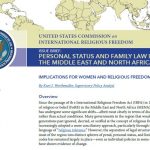By Raymond Ibrahim – Coptic Solidarity –
Discussing how a decade after curriculum reforms had supposedly been implemented, a recent report titled “Egypt’s Schools Still Teach Division and Discrimination” underscores the seriousness of the situation. Relevant excerpts follow:
[T]eachings can be found in religious education, Arabic language classes, and social studies, which promote conservative Islamic values at the expense of religious pluralism and other faiths. …
First, all programs—regardless of the classes and grades—include some Quranic verses and hadiths, and students of different religions are made to study and memorize them and sit for exams using these lessons. Some of the textbooks have passages that conflict with the beliefs of non-Muslims. One such instance can be found in an Arabic language lesson for the third preparatory level, as this Quranic verse is taught: “And who is better in speech than one who invites to Allah and does righteousness and says, ‘Indeed, I am of the Muslims.’”
Meanwhile, the education program is devoid of any lesson, text, or mention of other faiths or religions, with a total omission of Egyptian Christian or Jewish historical figures, or major non-Muslim religious holidays. ….
The second characteristic of the educational content is the emphasis that Islam is the only source of virtues and positive values in such a way that depicts other faiths as inciting wrongdoing, or at least not upholding the same values. ….
The school curricula and programs used in schools adopt the idea that Islam is the basis of human values and community relations—not citizenship or human bonding. The danger of that lies in having an education system fostering the ideology upheld by certain extremist groups that do not believe in equality and citizenship, claiming that rights are closely linked to the religious view one holds, instead of the constitution or the international human rights treaties.
The third feature of educational content is discrimination on the basis of religion and incitement against others. For instance, the Islamic religious education textbook for the fifth primary grade titled “Jund Allah,” or the soldier of God, praises the use of religion to justify the sense of patriotism, glorifying the 1973 October war which positioned Egypt and Arab states against Israel, to take back the Sinai. The lesson also discussed the Jewish community’s religious and historical heritage during the life of the Prophet, and how they were forced out of Medina, stressing their “treacherous nature.” The homework for this lesson includes assignments such as writing an essay on how “Yesterday’s Jews are today’s Jews,” looking for verses that talk about the Jewish community’s supposed treachery….
There are also several practices in schools that could encourage religious discrimination, such as the recitation of Quranic verses in the morning assembly at the beginning of the school day. During Islamic religious classes, Christian students are forced to leave the classroom to the school yard, where they gather for their religious classes and are not allotted a classroom.
The findings of this recent report are not limited to Egypt. Reports concerning the radical indoctrination of schoolchildren in Muslim-run schools—both in and out of the Muslim world—are common.
For instance, the U.S. Commission on International Religious Freedom issued a statement saying that it “is disappointed to find inflammatory content in Saudi textbooks that was previously thought to have been removed.” The commission “uncovered content promoting violence and hatred toward religious minorities and others,” often in connection to the Islamic doctrine of “loyalty and enmity,” which, based on the Koran (e.g., 60:4), requires Muslims to love what Allah loves and hate what Allah hates—which includes “infidels,” non-Muslims.
A separate report published by Human Rights Watch touched on the indoctrination process: “As early as first grade, students in Saudi schools are being taught hatred toward all those perceived to be of a different faith or school of thought… The lessons in hate are reinforced with each following year.”
Public schools in Qatar, a close U.S. “friend and ally,” also continue to promote extremist thinking. According to one report,
[A] review of 314 textbooks for the calendar years 2016–2020 determined that the Qatari curriculum did not yet meet international standards…. Textbooks … echoed antisemitic canards and reinforced the Qatari regime’s support for Islamist militant groups. While the curriculum emphasized nationalist identities over tribal affiliations, it was also influenced by pan-Islamic and pan-Arab nationalism as well as elements of Salafism and the Muslim Brotherhood… [One] lesson teaches that a woman’s fundamental purpose is to raise children to sacrifice their lives, in what is understood to be violent jihad, rather than to be productive and faithful Muslims…. A passage condemns Christianity and Judaism as religions which “have been corrupted”, and that polytheistic elements “have been inserted into them”; polytheism, meanwhile, is treated as a form of “ignorance” which is “false”. While this is a part of Islamic dogma, using this strongly negative language in a school textbook cultivates feelings of religious supremacy and deep intolerance of people with differing religious beliefs.
Needless to say, schools in Pakistan—where rampaging Muslim mobs recently torched 25 churches—also continue to “teach their children to hate Christians and other religious minorities,” one report found:
[I]nstead of minimizing hate materials and discouraging religious extremism [as the government had vowed to do after a particularly lethal Islamic terror attack on a school killed 132 students in 2014], the opposite seems to be occurring with a growing trend toward a more biased curriculum and more religious extremism being taught in Pakistan’s public schools.
Speaking in 2019, a Pakistani Christian leader said that religious “minorities are considered infidels and they are depicted negatively in textbooks, which promote prejudices against minorities.” Because of this:
Many minorities give their children Islamic names so they will not be singled out as Christians and become potential targets for discrimination in primary or secondary schools or at the college level…. In many cases, minority students do suffer abuse in public schools.
According to a 2022 report,
The 12th grade religious course book used in public schools in Turkey promotes armed jihad, ignoring the abuse of the jihad concept by violent terrorist groups such as al-Qaeda and the Islamic State in Iraq and Syria (ISIS).
The textbook reflects the prevailing ideology of the Islamist Justice and Development Party (AKP), led by Turkish President Recep Tayyip Erdoğan, who has been governing the NATO member country for the last 20 years.
School textbooks in Turkey also demonize non-Muslims. Speaking of her experiences, a former Muslim woman who converted to Christianity explained how “her opinion of Christians was very low because of the things she and others were taught to believe about Christians in a Muslim society.” According to the convert, who now lives in the U.S. and goes by the pseudonym Derya Little, “An anti-Christian attitude is a big part of the national identity, so anyone or anything that promotes Christianity is automatically suspicious.”
School textbooks taught her that “it was the Christians who wanted to plunder the lands and the riches of the Muslim world” and Turks merely responded by “defend[ing] what was rightfully theirs.” (In reality, modern day Turkey consists of territory that was Christian for more than a millennium before being conquered in the name of jihad.) “Everything is used to make the Christians look like villains,” she said, adding, “It’s the same all through Muslim countries.”
Until such time that public schools throughout the Muslim world—where the worldview of young Muslims are first formed—stop teaching hostility for and discrimination against non-Muslims, all talk about “combatting extremism” is doomed to failure.






[…] Indoctrinated to Hate […]